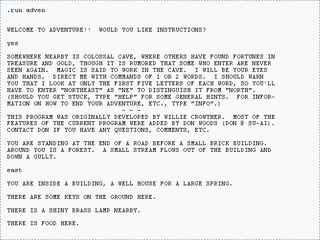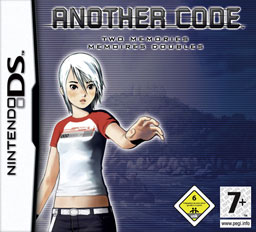Related Research Articles

Interactive fiction, often abbreviated IF, is software simulating environments in which players use text commands to control characters and influence the environment. Works in this form can be understood as literary narratives, either in the form of interactive narratives or interactive narrations. These works can also be understood as a form of video game, either in the form of an adventure game or role-playing game. In common usage, the term refers to text adventures, a type of adventure game where the entire interface can be "text-only", however, graphical text adventures still fall under the text adventure category if the main way to interact with the game is by typing text. Some users of the term distinguish between interactive fiction, known as "Puzzle-free", that focuses on narrative, and "text adventures" that focus on puzzles.

Puzzle video games make up a broad genre of video games that emphasize puzzle-solving. The types of puzzles can test many problem-solving skills including logic, pattern recognition, sequence solving, spatial recognition, and word completion.

Dr. Mario is a 1990 action puzzle video game produced by Gunpei Yokoi and designed by Takahiro Harada. Nintendo developed and published the game for the Nintendo Entertainment System and Game Boy consoles. The game's soundtrack was composed by Hirokazu Tanaka.
Inform is a programming language and design system for interactive fiction originally created in 1993 by Graham Nelson. Inform can generate programs designed for the Z-code or Glulx virtual machines. Versions 1 through 5 were released between 1993 and 1996. Around 1996, Nelson rewrote Inform from first principles to create version 6 . Over the following decade, version 6 became reasonably stable and a popular language for writing interactive fiction. In 2006, Nelson released Inform 7, a completely new language based on principles of natural language and a new set of tools based around a book-publishing metaphor.

Andrew Plotkin, also known as Zarf, is a central figure in the modern interactive fiction (IF) community. Having both written a number of award-winning games and developed a range of new file formats, interpreters, and other utilities for the design, production, and running of IF games, Plotkin is widely recognised for both his creative and his technical contributions to the homebrew IF scene.
System's Twilight: An Abstract Fairy Tale is a graphical interactive fiction computer game created by Andrew Plotkin and released in 1994.
Spider and Web is a piece of interactive fiction written by Andrew Plotkin.

Another Code: Two Memories, released as Trace Memory in North America, is a point-and-click adventure game developed by Cing and published by Nintendo for the Nintendo DS portable video game console. A sequel, Another Code: R – A Journey into Lost Memories, was released for the Wii.

Klonoa: Empire of Dreams is a 2001 platform video game published by Namco for the Game Boy Advance. Falling somewhere between Klonoa: Door to Phantomile and Klonoa 2: Lunatea's Veil, Empire of Dreams is a two-dimensional adventure game with puzzle elements that takes place in the new realm in the Klonoa series, the Kingdom of Jillius.
Jon Ingold is a British author of interactive fiction and co-founder of inkle, where he co-directed 80 Days. His interactive fiction has frequently been nominated for XYZZY Awards and has won on multiple occasions, including Best Game, Best Story and Best Setting awards for All Roads in 2001. Ingold's works are notable for their attention to the levels of knowledge that the player and player character have of the in-game situation, with the effect often depending on a player who understands more than the character or vice versa. Ingold has also written a number of plays, short stories and novels.
A Change in the Weather is an interactive fiction (IF) video game.

Fez is an indie puzzle-platform video game developed by Polytron Corporation and published by Trapdoor. The player-character Gomez receives a fez that reveals his two-dimensional (2D) world to be one of four sides of a three-dimensional (3D) world. The player rotates between these four 2D views to realign platforms and solve the game's puzzles. The objective of the game is to collect cubes and cube fragments to restore order to the universe.

Limbo is a puzzle-platform video game developed by independent studio Playdead. The game was released in July 2010 on Xbox Live Arcade, and has since been ported to several other systems, including the PlayStation 3, Linux and Microsoft Windows. Limbo is a 2D side-scroller, incorporating a physics system that governs environmental objects and the player character. The player guides an unnamed boy through dangerous environments and traps as he searches for his sister. The developer built the game's puzzles expecting the player to fail before finding the correct solution. Playdead called the style of play "trial and death", and used gruesome imagery for the boy's deaths to steer the player from unworkable solutions.

The Imitation Game is a 2014 American historical drama film directed by Morten Tyldum and written by Graham Moore, based on the 1983 biography Alan Turing: The Enigma by Andrew Hodges. The film's title quotes the name of the game cryptanalyst Alan Turing proposed for answering the question "Can machines think?", in his 1950 seminal paper "Computing Machinery and Intelligence". The film stars Benedict Cumberbatch as Turing, who decrypted German intelligence messages for the British government during World War II. Keira Knightley, Matthew Goode, Rory Kinnear, Charles Dance, and Mark Strong appear in supporting roles.

Gorogoa is a puzzle video game developed by Jason Roberts and published by Annapurna Interactive. The game was released for Microsoft Windows, Nintendo Switch, and iOS on 14 December 2017, PlayStation 4 and Xbox One in March 2018, and shortly thereafter an Android and Kindle Fire release.
Hundreds is a mobile puzzle video game where players touch circles to make them grow without overlapping. In the game's 100 levels, the player interacts with different types of circles to bring a counter to the number 100. The game was developed and published by Semi Secret Software in collaboration with Greg Wohlwend and was released for iOS on January 7, 2013, and on Android later that year.

Asher Vollmer is an American indie video game developer and creator of Puzzlejuice and Threes. He created the 2012 iOS game Puzzlejuice while a student at USC Interactive Media & Games Division. The game began his collaboration with Greg Wohlwend. The pair's next release, the 2014 iOS puzzle game Threes, received what review aggregator Metacritic described as "universal acclaim", including perfect scores from Eurogamer and TouchArcade, and the title of Apple Inc.'s iPhone game of the year. The game was later ported to multiple platforms. Polygon included Vollmer in their "50 admirable gaming people" of the year for his work on Threes. Among other projects, Vollmer subsequently worked on Close Castles, a real-time strategy game later put on hiatus, and Royals, a simulation game for OS X and Windows.

Jewels of the Oracle is a 1995 adventure game developed by ELOI Productions and published by Discis Knowledge Research Inc. It was released on Macintosh, PlayStation, Sega Saturn, and Windows. A sequel developed by Bardworks and published by Hoffman and Associates was released in 1998 entitled Jewels II: The Ultimate Challenge.
Lumines is a puzzle video game series developed by Q entertainment. The core objective of the games is to survive by rotating and aligning 2×2 blocks varying between two colors to form 2×2 squares of a single color which will be erased when the Time Line passes over them. The game is lost when the blocks reach the top of the playing field.
References
- ↑ Old Zarf code by Andrew Plotkin (June 24, 2014)